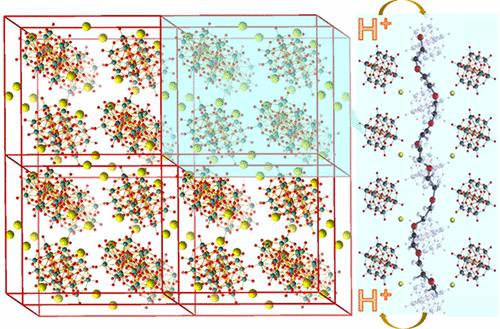Spatial-Temporal Characteristics of Confined Polymer Motion Determine Proton Conduction of Polyoxometalate-Poly(ethylene glycol) Hybrid Nanocomposites
Huarui Wu‡, Lengwan Li†, Masaki Tsuboi§, Yongqiang Cheng||, Weiyu Wang†, Eugene Mamontov|| ![]() ,
,
Sayaka Uchida§ ![]() , Zhe Wang*‡
, Zhe Wang*‡ ![]() , and Panchao Yin*†
, and Panchao Yin*† ![]()
† South China Advanced Institute for Soft Matter Science and Technology & State Key Laboratory of Luminescent Materials and Devices, South China University of Technology, Guangzhou 510640, China
‡ Department of Engineering Physics, Tsinghua University, Beijing 100084, China
§ Department of Basic Sciences, School of Arts and Sciences, The University of Tokyo, 3-8-1 Komaba, Meguro-ku, Tokyo 153-8902, Japan
|| Neutron Scattering Division, Oak Ridge National Laboratory, Oak Ridge, Tennessee 37831, United States
J. Phys. Chem. Lett., 2018, 9 (19), pp 5772–5777
DOI: 10.1021/acs.jpclett.8b02113
Publication Date (Web): August 14, 2018
Copyright © 2018 American Chemical Society
*E-mail: zwang2017@mail.tsinghua.edu.cn (Z.W.); yinpc@scut.edu.cn (P.Y.)

Highly efficient proton conductors, polyoxometalate–poly(ethylene glycol) (POM–PEG) hybrid nanocomposites, have been synthesized by encapsulating a single PEG chain inside the 1D nanochannel defined by the frameworks of POMs. By employing two types of neutron scattering techniques complemented by thermal analysis, we prove that in a nanochannel a single PEG chain stays as a distorted helix. More importantly, we reveal that the PEG segments perform a localized longitudinal random walk and quantitatively show the strong correlation between the local motion of PEG and the macroscopic proton conduction of the material. On the basis of these spatial-temporal characteristics, a microscopic picture for the proton conduction process of POM–PEG hybrid materials is proposed.

